Search
Search Results
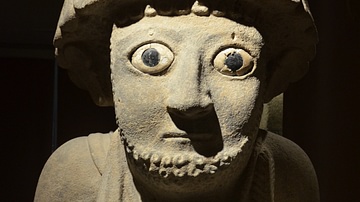
Image
Neo-Hittite King Suppiluliuma
Neo-Hittite statue of King Suppiluliuma unearthed in 2012 at Kunulua, the capital of the Neo-Hittite Kingdom of Patina (1000-738 BCE) in southeastern Turkey. The remains of the figure stand approximately 1.5 meters in height, suggesting a...
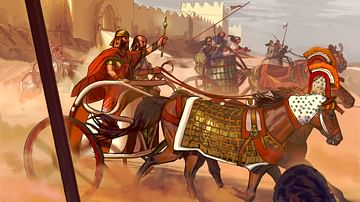
Image
Hittite War Chariots
Artist's impression of ancient Hittite war chariots leaving a Hittite city for battle. The Hittites were present in Anatolia from around 1700 to 1200 BCE. Created by Amplitude Studios for the video game Humankind.
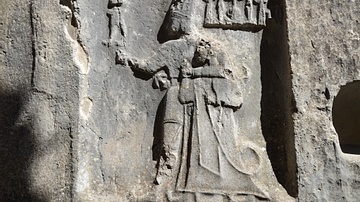
Image
Hittite relief of the God Sharruma and King Tudhaliya
East wall of Chamber B of the Yazilikaya Hittite Rock Sanctuary near Hattusa (13th century BCE) depicting in a niche the God Sharruma (the Hurrian Mountain God and son of the Thunder God Teshub) embracing Great King Tudhaliya IV (r. c. 1237–1209...
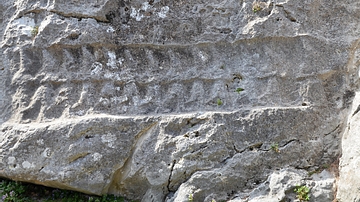
Image
Rock Relief with Procession of Hittite Deities at Yazilikaya
Rock relief in Chamber A of the Yazilikaya Hittite Sanctuary (13th century BCE) near Hattusa depicting a procession of male deities. They all wear shoes curling up at the toe, and many are armed with either a sickle-shaped sword or a mace...
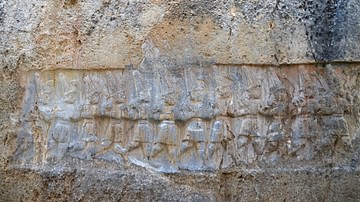
Image
Twelve Gods of the Underworld, Yazilikaya Hittite Sanctuary
West wall of Chamber B of the Yazilikaya Hittite Sanctuary near Hattusa (13th century BCE) depicting the Twelve Gods of the Underworld. They wear short shirts, belts and shoes curling up at the toe. They each carry a crescent-shaped sword...
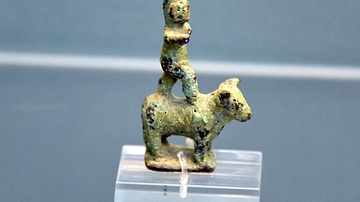
Image
Figure of the Hittite God Teshub
The storm-god Teshub wears a tall headdress and stands on the back of a bull. From modern-day Turkey. Bronze figurine. Hittite period, 1600-1200 BCE. (The British Museum, London).
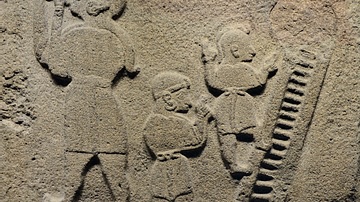
Image
Hittite Orthostat with Acrobats
Hittite orthostate relief depicting a conjurer and acrobats. The performer on the left swallows a sword, the smaller acrobat goes up the stairs without holding on. 14th century BCE. Museum of Anatolian Civilizations, Ankara (Turkey).
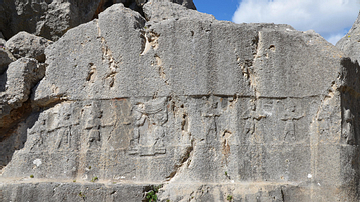
Image
Hittite Rock Relief at Yazilikaya
Rock relief in Chamber A of the Yazilikaya Hittite Sanctuary (13th century BCE) depicting two bull-headed men standing between male gods on the hieroglyphic symbol of the earth, and supporting the sky.
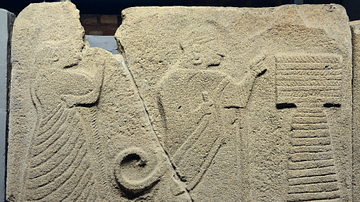
Image
Hittite Orthostat with King and Queen
Hittite orthostat relief from Alacahöyük depicting a king and a queen in front of the altar. The King carries the kingdom sceptre (lituus) in his right hand and extends his left hand forward for worship. 14th century BCE. Museum of Anatolian...

Image
Hittite relief of a Winged Lion-Headed Demon at Yazilikaya
Entrance to Chamber B of the Yazilikaya Hittite Rock Sanctuary near Hattusa (13th century BCE) with a relief of a winged, lion-headed demon.